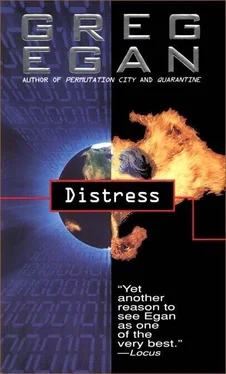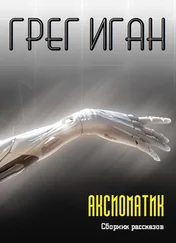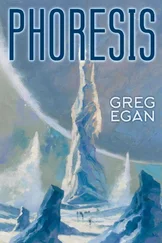Грег Иган - Distress
Здесь есть возможность читать онлайн «Грег Иган - Distress» весь текст электронной книги совершенно бесплатно (целиком полную версию без сокращений). В некоторых случаях можно слушать аудио, скачать через торрент в формате fb2 и присутствует краткое содержание. Жанр: Фантастика и фэнтези, на английском языке. Описание произведения, (предисловие) а так же отзывы посетителей доступны на портале библиотеки ЛибКат.
- Название:Distress
- Автор:
- Жанр:
- Год:неизвестен
- ISBN:нет данных
- Рейтинг книги:3 / 5. Голосов: 1
-
Избранное:Добавить в избранное
- Отзывы:
-
Ваша оценка:
- 60
- 1
- 2
- 3
- 4
- 5
Distress: краткое содержание, описание и аннотация
Предлагаем к чтению аннотацию, описание, краткое содержание или предисловие (зависит от того, что написал сам автор книги «Distress»). Если вы не нашли необходимую информацию о книге — напишите в комментариях, мы постараемся отыскать её.
Distress — читать онлайн бесплатно полную книгу (весь текст) целиком
Ниже представлен текст книги, разбитый по страницам. Система сохранения места последней прочитанной страницы, позволяет с удобством читать онлайн бесплатно книгу «Distress», без необходимости каждый раз заново искать на чём Вы остановились. Поставьте закладку, и сможете в любой момент перейти на страницу, на которой закончили чтение.
Интервал:
Закладка:
"The Voluntary Autists don’t oppose that option. All we’re campaigning for is the legalization of the alternative."
"Enlargement of the lesion?"
"Yes. Up to and including the complete excision of Lament’s area."
"Why?"
"Again, that’s a complicated question. Everyone has a different reason. For a start, I’d say that as a matter of principle, we should have the widest possible range of choices. Like transsexuals."
That was a reference to another kind of brain surgery which had once been highly controversial: NCR. Neural gender reassignment. People born with a mismatch between neural and physical gender had been able to have their bodies resculpted—with increasing precision—for almost a century. In the twenties, though, another option had become feasible: changing the gender of the brain; altering the hardwired neural map of the body image to bring it into line with the existing flesh and blood. Many people—including many transsexuals—had campaigned passionately against legalizing NCR, fearing coercion, or surgery carried out on infants. By the forties, though, it had become generally accepted as a legitimate option, freely chosen by about twenty percent of transsexuals.
I’d interviewed people undergoing every kind of reassignment operation, for Gender Scrutiny Overload. One neural man born with a female body had proclaimed ecstatically—after being resculpted en-male—"This is it! I’m free, I’m home!" And another—who’d opted for NGR— had gazed into a mirror at her unchanged face and said, "It’s like I’ve broken out of some kind of dream, some kind of hallucination, and I can finally see myself as I really am." Judging from audience feedback to Gender, the analogy would attract enormous sympathy—if it was allowed to stand.
I said, "The endpoint of either operation on transsexuals is a healthy man or woman. That’s hardly the same as becoming autistic."
Rourke countered, "But we do suffer a mismatch, just like transsexuals. Not between body and brain but between the drive for intimacy and the inability to attain it. No one—save a few religious fundamentalists— would be cruel enough to tell a transsexual that they’ll just have to learn to live with what they are, and that medical intervention would be a wicked self-indulgence."
"But no one’s stopping you from choosing medical intervention. The graft is legal. And success rates are sure to improve."
"And as I’ve said, VA don’t oppose that. For some people, it’s the right choice."
"But how can it ever be the wrong choice ?"
Rourke hesitated. No doubt he’d scripted and rehearsed everything he’d wanted to say—but this was the heart of it. To have any hope of winning support for his cause, he was going to have to make the audience understand why he did not want to be cured.
He said carefully, "Many fully autistic people suffer additional brain damage, and various kinds of mental retardation. In general, we don’t. Whatever damage we’ve suffered to Lament’s area, most of us are intelligent enough to understand our own condition. We know that non-autistic people are capable of believing that they’ve achieved intimacy. But in VA, we’ve decided we’d be better off without that talent."
"Why better off?"
"Because it’s a talent for self-deception."
I said, "If autism is a lack of understanding of others… and healing the lesion would grant you that lost understanding—"
Rourke broke in, "But how much is understanding—and how much is a delusion of understanding? Is intimacy a form of knowledge, or is it just a comforting false belief? Evolution isn’t interested in whether or not we grasp the truth, except in the most pragmatic sense. And there can be equally pragmatic falsehoods. If the brain needs to grant us an exaggerated sense of our capacity for knowing each other—to make pair-bonding compatible with self-awareness—it will lie, shamelessly, as much as it has to, in order to make the strategy succeed."
I’d fallen silent, not knowing how to respond. Now I watched Rourke waiting for me to continue. Though he appeared as awkward and shy as ever, there was something in his expression which chilled me. He honestly believed that his condition had granted him an insight no ordinary person could share—and if he didn’t exactly pity us our hardwired capacity for blissful self-deception, he couldn’t help but perceive himself as having the broader, clearer view.
I said haltingly, "Autism is a… tragic, disabling disease. How can you… romanticize it into nothing more than some kind of… viable alternative lifestyle?"
Rourke was polite, but dismissive. "I’m not doing any such thing. I’ve met over a hundred fully autistic people, and their families. I know how much pain is involved. If I could banish the condition tomorrow, I’d do it.
"But we have our own histories, our own problems, our own aspirations. We’re not fully autistic—and excision of Lamont’s area, in adulthood, won’t render us the same as someone who was born that way. Most of us have learned to compensate by modeling people consciously, explicitly—it takes far more effort than the innate skill, but when we lose what little we have of that, we won’t be left helpless. Or selfish, or merciless,' or 'incapable of compassion'—or any of the other things the murdochs like to claim. And being granted the surgery we’ve asked for won’t mean loss of employment, let alone the need for institutional care. So there’ll be no cost to the community—"
I said angrily, "Cost is the least of the issues. You’re talking about deliberately—surgically—ridding yourself of something… fundamental to humanity ."
Rourke looked up from the floor and nodded calmly, as if I’d finally made a point on which we were in complete agreement.
He said, "Exactly. And we’ve lived for decades with a fundamental truth about human relationships—which we choose not to surrender to the comforting effects of a brain graft. All we want to do now is make that choice complete. To stop being punished for our refusal to be deceived."
Somehow, I whipped the interview into shape. I was terrified of paraphrasing James Rourke; with most people, it was easy enough to judge what was fair and what wasn’t, but here I was on treacherous ground. I wasn’t even sure that the console could convincingly mimic him—when I tried it, the body language looked utterly wrong, as if the software’s default assumptions (normally used to flesh out an almost-complete gestural profile gleaned from the subject) were being pumped out in their entirety to fill the vacuum. I ended up altering nothing—merely extracting the best lines, and setting them up with other material—and resorting to narration, when there was no other way.
I had the console show me a diagram of the segments I’d used in the edited version, slivers scattered throughout the long linear sequence of the raw footage. Each take—each unbroken sequence of filming—was clearly "slated": labeled with time and place, and a sample frame at the start and end. There were a few takes from which I’d extracted nothing at all; I played them through one last time, to be sure I hadn’t left out anything important.
There was some footage where Rourke was showing me into his "office"—a corner of the two-room flat. I’d noticed a photograph of him—probably in his early twenties—with a woman about the same age.
I asked who she was.
"My ex-wife."
The couple stood on a crowded beach, somewhere Mediterranean-looking. They were holding hands and trying to face the camera—but they’d been caught out, unable to resist exchanging conspiratorial sideways glances. Sexually charged, but… knowing, too. If this wasn’t a portrait of intimacy, it was a very good imitation.
Читать дальшеИнтервал:
Закладка:
Похожие книги на «Distress»
Представляем Вашему вниманию похожие книги на «Distress» списком для выбора. Мы отобрали схожую по названию и смыслу литературу в надежде предоставить читателям больше вариантов отыскать новые, интересные, ещё непрочитанные произведения.
Обсуждение, отзывы о книге «Distress» и просто собственные мнения читателей. Оставьте ваши комментарии, напишите, что Вы думаете о произведении, его смысле или главных героях. Укажите что конкретно понравилось, а что нет, и почему Вы так считаете.










![Грег Иган - Рассказы [компиляция]](/books/419837/greg-igan-rasskazy-kompilyaciya-thumb.webp)
